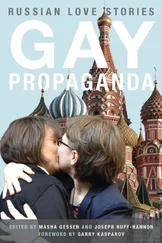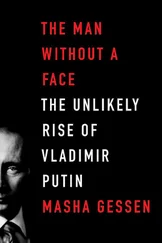“It’s so beautiful,” she said.
“I’ve been walking past this flower shop every day,” he said. “I’ve been thinking, Someday I’ll meet a girl and then I’ll get her that bouquet .”
• • •
ZUBEIDAT PANICKED EARLY,possibly as early as that first date. “They’ll never let us marry,” she said. “Not even my brother. Even though he left Dagestan so long ago that he lives like a Russian—he’ll never let me marry someone who is not Avar.”
“You know, I don’t care,” Anzor said. “If our families say no, we’ll just run away. I’ll be your mother, your father, your brother, and your sister.”
But first he was going to take her to his family’s home in Kyrgyzstan. By this time Zubeidat knew that, though they both claimed to hail from the Caucasus and in a way they both did, Anzor was a man born in exile. And Zubeidat was perhaps starting to sense that she was born for exile.
• • •
ON MARCH 7, 1944,the Supreme Soviet of the USSR passed a resolution that began:
Whereas in the course of the Patriotic War, especially while the German fascist armies were active in the Caucasus, many Chechens and Ingush betrayed the Motherland, switched over to the side of the fascist occupiers, joined the ranks of saboteurs and intelligence-gatherers dispatched by the Germans to the rear of the Red Army, created, at the Germans’ direction, armed groups to fight against the Soviet authorities, and in light of the fact that many Chechens and Ingush over the course of many years took part in armed attacks on the Soviet authorities and over the course of a long time, rather than engage in honest labor, committed armed robberies on the collective farms in neighboring regions, robbing and killing Soviet people, the Presidium of the Supreme Soviet of the USSR has resolved:
1. All Chechens and Ingush residing on the territory of the Chechen Ingush Autonomous Soviet Socialist Republic and neighboring areas shall be moved to other areas of the USSR and the Chechen Ingush Autonomous Soviet Socialist Republic shall be liquidated.
This resolution, which was unclassified but also unpublished, had been preceded by a series of secret meetings, resolutions, and decrees convened and issued over the course of about six months. As the Red Army pushed the Germans out of the Caucasus and began to advance in Belarus and Ukraine as well, Stalin had become obsessed with the Soviet citizens living in the parts of the country the Germans had occupied starting in 1941. Throughout the war he had believed that soldiers who had allowed themselves to be taken prisoner were traitors. Those lucky enough to have been freed were immediately re-incarcerated in the Gulag, for treason. What about those who lived in their own homes under German rule for years? Were they similarly contaminated? Had they welcomed the Germans? Had they cooperated willingly, cooking and cleaning for them and enforcing German rule in their own land? Had they over time come to like the Germans? Had they come to love them? Did they remain loyal to them after the occupation ended? What was the Soviet regime to do with the millions of its own citizens who were now suspect? Stalin might have liked to exterminate or exile the entire populations of Ukraine and Belarus, but they were too large to be isolated or removed effectively—and in any case, at the time he was confronted with the problem of the Caucasus, the Red Army had not yet advanced far into Ukraine and Belarus.
Stalin, who was half Ossetian—a North Caucasian ethnic group that is majority Christian—was perhaps most suspicious of the Muslims in the region. The largest Muslim group in the Russian North Caucasus were the Chechens, traditionally cattle farmers in the mountains and grain farmers in the valleys. Among them, an anti-Soviet insurgency had indeed existed, and it had welcomed the Germans, though most of Chechnya was in fact never occupied and the majority of Chechens were, by all accounts, loyal Soviet citizens. The Chechens were the largest group to face deportation, though not the only one. In all, seven ethnic groups with a total population of over 1.5 million would be removed from lands on which they had lived, and which they had defended for centuries in many wars. They would be moved to what, on the map, looked like vast empty space in Soviet Central Asia: over a million people would go to Kazakhstan and the rest to Kyrgyzstan. Smaller numbers of other exiles had already been shipped there—the Kalmyks, a Buddhist people who had lived on the western shore of the Caspian Sea, and ethnic Germans, who had once settled along the Volga River.
On February 23, 1944, all Chechens living in Chechnya and neighboring republics were ordered to report to designated assembly points in their towns and villages. They were loaded onto trucks or marched the distance—sometimes dozens of miles over snowy forested mountains—to the trains that would take them to Central Asia. In at least one location about seven hundred elderly, disabled, and people too young or too weak to make the trek from their high-altitude villages were herded into a barn and burned alive. Resisters, protesters, and sometimes the merely confused and slow were shot on the spot. Over half a million Chechens and Ingush—a closely related smaller ethnic group—were loaded onto cattle cars, which began the nearly two-thousand-mile journey to Central Asia. About 85,000 of them would end up in Kyrgyzstan: the trains began arriving March 4, a week after they left Chechnya and three days before the Supreme Soviet issued its resolution. This was less than half a year before the first Nazi concentration camp was liberated and the Western world began a decades-long inquiry into the fates of other exiles and the trains that had carried them. The fate of the deported peoples of the Caucasus would never be similarly examined.
Over the years frightful estimates of the number of people who died en route to Central Asia have circulated, but in fact the journey was essentially undocumented: the sealed trains passed through the country anonymously, never stopping for food supplies or bathroom breaks. The exiles fashioned holes in the floors of their overcrowded cars to relieve themselves; they tried to ration such supplies of bread and water as some of them had carried; washing was out of the question. The typhus epidemic began on the trains. When the first trains pulled into Kyrgyzstan on March 4, they carried twenty-five corpses—the exiles had thrown off the rest of the bodies along the way, in the vain hope of avoiding contagion. Eight hundred people were diagnosed with typhus on arrival.
Before the exiles arrived, local authorities had reported to Moscow that they had set aside enough supplies to feed the newcomers for four months. The rations were set at 116 grams of flour and 56 grams of grain a day per person—significantly less than the starvation rations of Auschwitz-Birkenau. By April 1, some 125,000 people had arrived from the Caucasus, members of seven distinct ethnic groups. Of them, 52,876 were judged fit for work upon arrival. Four months later, the number of those fit for work was 43,713: most of the nine thousand people who had lost their ability to work were, in the language of the corresponding reports, “extremely emaciated.” In those first four months 5,128 people died, including 770 from typhus and 1,778 from starvation. The malaria epidemic began in midsummer.
If the meager supplies ostensibly prepared for the deportation ever really existed, they were not getting to the exiles. A secret report on the inspection of a collective farm in June 1944 stated that the “special settlers,” as the authorities euphemistically called them, were not working, or working sufficiently well, “mostly due to the absence of food supplies, as a consequence of which the absolute majority of the special settlers are extremely emaciated…. Thirteen people have died as a result of typhus and starvation. Ill people in a state of extreme emaciation, essentially at death’s door, as of June 8 this year number 40, including 20 children…. Special settlers are eating mostly grass…. No one is keeping track of special-settler deaths.” The report described the mother of four children aged two to ten, the three youngest of whom could no longer move; she was making them soup out of grass. Reports from other collective farms painted a similar picture, but introduced a new category beyond “extremely emaciated.” This category was “bloated.”
Читать дальше












